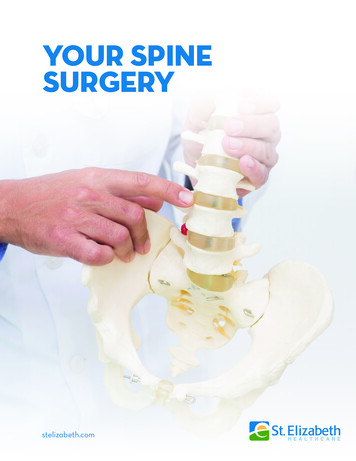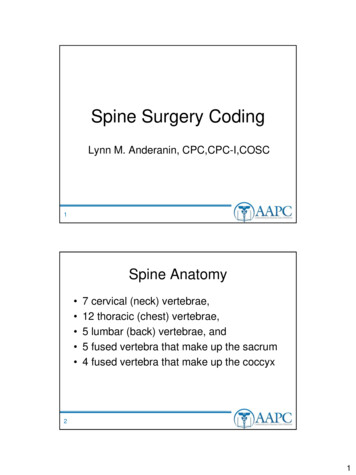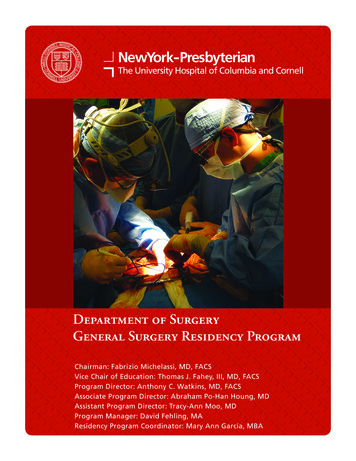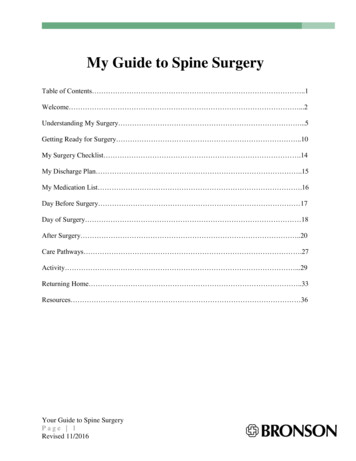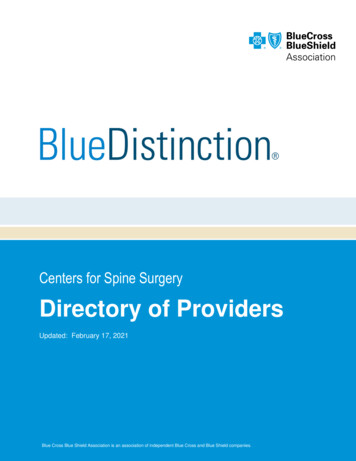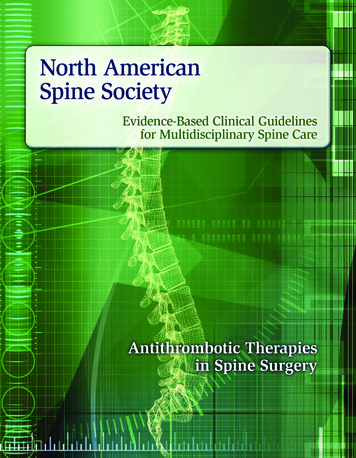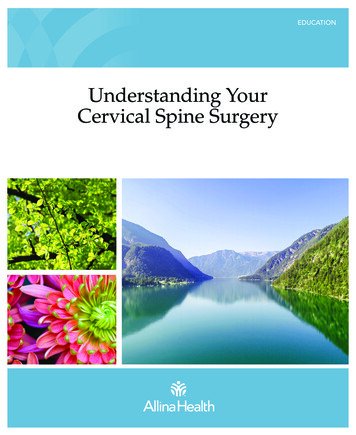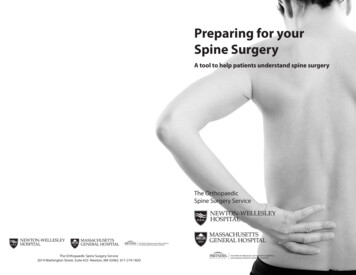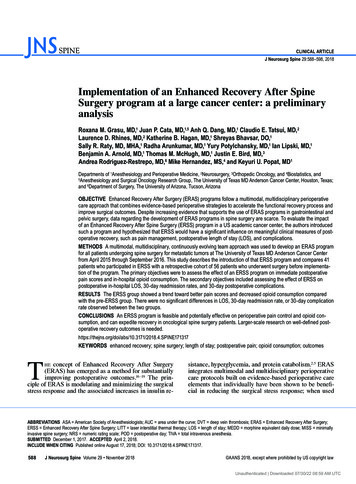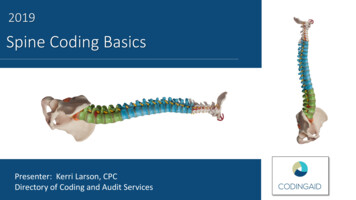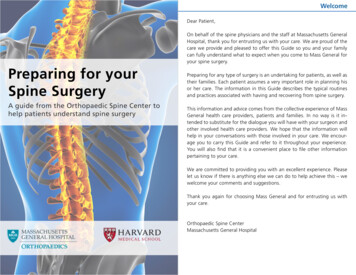
Transcription
WelcomeDear Patient,On behalf of the spine physicians and the staff at Massachusetts GeneralHospital, thank you for entrusting us with your care. We are proud of thecare we provide and pleased to offer this Guide so you and your familycan fully understand what to expect when you come to Mass General foryour spine surgery.Preparing for yourSpine SurgeryA guide from the Orthopaedic Spine Center tohelp patients understand spine surgeryPreparing for any type of surgery is an undertaking for patients, as well astheir families. Each patient assumes a very important role in planning hisor her care. The information in this Guide describes the typical routinesand practices associated with having and recovering from spine surgery.This information and advice comes from the collective experience of MassGeneral health care providers, patients and families. In no way is it intended to substitute for the dialogue you will have with your surgeon andother involved health care providers. We hope that the information willhelp in your conversations with those involved in your care. We encourage you to carry this Guide and refer to it throughout your experience.You will also find that it is a convenient place to file other informationpertaining to your care.We are committed to providing you with an excellent experience. Pleaselet us know if there is anything else we can do to help achieve this – wewelcome your comments and suggestions.Thank you again for choosing Mass General and for entrusting us withyour care.Orthopaedic Spine CenterMassachusetts General Hospital
Our Spine TeamTable of ContentsSection 1: Our Spine Team . . . . . . . . . . . . . . . . . . . . . . . . . . . 1Section 1: Our Spine TeamSection 2: Consulting with Our Doctors . . . . . . . . . . . . . . . . . . .4Section 3: Spine Anatomy & Procedure Overview . . . . . . . . . . . . . .6Your Health Care TeamIt takes many people to make a hospital run smoothly. Your health careteam will work together to make your hospital stay a positive, comfortableand successful experience. Feel free to ask questions and share concernswith any member of your team. The following are some staff who willprovide your hospital care:Section 4: Preparing for your Surgery . . . . . . . . . . . . . . . . . . . . 11Section 5: PPE Phone Call & Anesthesia . . . . . . . . . . . . . . . . . . . 23Section 6: Your Surgery . . . . . . . . . . . . . . . . . . . . . . . . . . . 24 Section 7: Your Hospital Stay . . . . . . . . . . . . . . . . . . . . . . . . 29Section 8: Leaving Mass General . . . . . . . . . . . . . . . . . . . . . . 38 Section 9: Returning Home . . . . . . . . . . . . . . . . . . . . . . . . . 42Section 10: Frequently Asked Question . . . . . . . . . . . . . . . . . . . 48 Pre-Surgical Checklist . . . . . . . . . . . . . . . . . . . . . . . . . . . . 53 Updated: December 20201Attending Physician: This is your surgeon who will be primarily responsible for your care during your hospital stay. He or she will workin conjunction with fellows, residents, physician assistants (PAs) andnurse practitioners (NPs) to provide comprehensive care. See our Spine PhysiciansFellow: Doctors who have completed residency training in orthopaedic surgery and are specializing in spine surgery. See our Spine FellowsResident: Doctors in their second through fifth year of specializedtraining in orthopaedic surgery.Physician Assistant (PA): Clinicians with specialized training whoare part of the surgical team and care for you throughout your surgical journey. They may assist your surgeon in the Operating Room(OR), during your hospital stay and at your follow-up appointment. See our Spine PAsNurse Practitioner (NP): Nurses with advanced training who arepart of your surgical team and care for you throughout your surgicaljourney. They may assist your surgeon in the Operating Room (OR),during your Hospital stay and at your follow-up visit. See our Spine NPsAnesthesiologist: A medical doctor with advanced training in anesthesiology. They will administer your anesthesia during surgery.Nurse Anesthetist (CRNA): A nurse with advanced training whoadministers anesthetics under the supervision of an anesthesiologist.Hospitalist: A medical doctor who may see you during your hospitalstay at the request of your surgeon.Preparing for your Spine Surgery
Our Spine TeamOur Spine TeamNursing Staff: A registered nurse (RN) will care for you throughout yourhospital stay. Your nurse will make sure you receive the appropriate medications, medical treatments and tests ordered by your clinicians. Your nursewill also provide information and education to prepare you for discharge.A nurse is always available to answer questions or to discuss concerns youor your family may have. The name of the nurse caring for you on eachshift will be available at the nurses’ station or listed on a board in yourroom. Rehabilitation Staff: These staff members have an important role inhelping you recover from your spine surgery. Patient Care Assistant (PCA): The patient care assistant will assistyour nurse in providing your daily care. They may help with bathing,taking vital signs or transporting you to and from tests. Care Coordination Team Case Manager: This is a nurse who may assist with your dischargeplanning if you need services and/or equipment upon discharge. Thecase manager is familiar with resources in your community and maybe able to help arrange home care, or if necessary, an appropriateextended-care facility. They can also help with any questions or problems about what services and/or equipment your medical insurancecovers, as well as financial issues that may impact your recovery and/or access to services/equipment.Social Worker: A social worker is always available to discuss anyconcerns that you or your family may have related to your diseaseand the associated stress it may have on you and your significantothers, including what concerns you may have about planning fordischarge. They may also assist with arranging home care, placementin an extended-care facility, and/or facilitating equipment needed forhome.Preparing for your Spine Surgery2 Physical Therapist (PT): A PT may work with you during your hospital stay to get you moving around safely after your surgery. The PTwill teach you how to safely get in and out of bed, walk with or without a device and walk up/down stairs (if needed). The PT will educateyou regarding your surgeon’s expectations for you upon leaving thehospital.Occupational Therapist (OT): The OT will address training you inhow to perform activities of daily living including bathing, dressing,grooming and toileting so that you are as safe and independent aspossible, either with the use of adaptive equipment or with compensatory strategies focusing on body mechanics. The OT will address training with functional mobility and transfers to assess for anynecessary equipment or DME you might need at your toilet or tub/shower stall area prior to your discharge home.Physical Therapy Assistant (PTA): A PTA may assist your physicaltherapist in exercises and mobility training. The PTA carries out the goalsset by the PT. While we try to maintain consistency in care having yoursame therapist, it may be necessary to have a different therapist or PTAfollow you after your initial evaluation.Other Hospital Staff: Housekeepers, dietary workers, radiology technicians,chaplains, pharmacists, transporters and other staff members are all part ofyour health care team.3Preparing for your Spine Surgery
Consulting with Our DoctorsConsulting with Our DoctorsSection 2: Consulting with Our DoctorsAppointments with the Mass General Spine TeamThere are differnent ways to facilitate an appointment with the Spine Center: To make an appointment with one of our surgeons, please contact theSpine Center at 617-724-8636 and our staff will assist in making anappointment. If you have not had recent imaging (MRI or CT scan within the last oneyear), have not had any conservative care (physical therapy or injections),and have not had symptoms for longer than three months, you may bereferred to our Access Clinic, where you will be appropriately worked upby one of our Advanced Practice Providers (APPs). The APP team is madeup of Physician Assistants (PAs) and Nurse Practitioners (NPs). If you or your treating physician believes that you may require an urgentappointment, please have a referral placed as “urgent.” This service willprovide a streamlined appointment to the appropriate clinician.Once you have your appointmentOnce you have an appointment with the Spine Center, you may havequestions: Who will be my doctor? What is their specialty? Is surgery my only option?The answers to these questions will vary depending upon what is right for youand your condition. Surgery is just one option - and it will be an appropriatetreatment for some, but not for everyone. Your team at the Spine Center willwork together to develop the best treatment plan for you.To help you get a sense of what you will experience at the Spine Center,see the chart to the right. The majority of new patients that come to ourCenter may be evaluated by several different kinds of clinicians.A Spine Center appointment is madeAccess to ourPhysiatristsAccess to ourPain SpecialistsAccess to ourSurgeonsCustomized care plan is developed andfollow-up recommendedWhat to Expect during your AppointmentWhen you first check-in for your appointment, you may be asked to takenew x-rays. Our x-ray clinic is located down the hall from the clinic rooms.During your appointment, your clinician will go over your x-ray with you.You can also expect: Preparing for your Spine Surgery45A thorough evaluation and discussion with our specialistsReview of your x-rays, MRIs and any additional medical recordsAn in-depth conversation covering treatment optionsCustomized treatment plan to get you back to an active lifestylePreparing for your Spine Surgery
Spine Anatomy & Procedure OverviewSpine Anatomy & Procedure OverviewSection 3: Spine Anatomy & Procedure OverviewAs a patient considering spine surgery, you probably have many questions.This information will help you understand spine anatomy and potentialsources of symptoms.The spine is made up of a series of vertebra. There are seven cervical(neck), 12 thoracic (mid-back) and five lumbar (low back) vertebrae (Figure1A & 1B). The vertebra is composed of a solid section called the body thatsits anteriorly (in the front) and a ring of bone posteriorly (in the back).This ring of bone creates a canalthrough which the spinal columnand nerve roots run (Figure 2). Thebony arch consists of the pedicle,paired transverse process, facetjoints, lamina and spinous process.Between each vertebra is a discthat serves as a shock absorber andprovides height between two vertebrae. The disc has circular bandsof cartilage called the annulus,which encases a gelatinous centercalled the nucleus (Figure 2).Figure 2: Healthy DiscThe discs between the vertebrae allow the back to flex or bend. With aging inaddition to the wear and tear we put on our bodies, degenerative changes inthe spine can occur. The discs between the vertebrae (bones) may degenerateand lose some of their water content. The annulus may weaken, allowing thedisc to protrude or become herniated (Figure 3 & 4).Figure 1A: Spine VertebraePreparing for your Spine SurgeryFigure 3: Herniated DiscFigure 1B: Spine Vertebrae67Preparing for your Spine Surgery
Spine Anatomy & Procedure OverviewFigure 4: Disc DegenerationSpine Anatomy & Procedure OverviewThe facet joints may developbony overgrowth due to arthritis.These changes can also lead tonarrowing, or stenosis, of thespinal canal. Spinal stenosis cancause the nerves to be pinchedas they pass through the canaland foramen (shown in Figure5). The nerves become inflamed,which can cause pain in theircorresponding body part. In theneck, patients may experiencearm pain, and in the lower backpatients may experience pain inthe buttocks and/or legs. Thesechanges can occur anywherealong the spine. We frequentlysee pathologies develop in theneck (cervical) or lower back(lumbar) spine.NeckWhen pressure is placed on a nerve in the neck, it may cause pain inthe muscles between your neck and shoulder (trapezius muscles).The painmay shoot down the arm. The pain may also cause headaches in the backof the head. Other symptoms may include: Weakness in your arms or hands Difficulty using your fine motor skills, such as buttoning buttons ortying your shoes Tingling (a “pins-and-needles” sensation) or numbness in your armsor hands Burning pain in the shoulders, neck or arm Trouble with balance or walkingOver time, arthritis of the neck (cervical spondylosis) may result from bonyspurs and problems with ligaments and discs. The spinal canal may narrow(stenosis) and compress the spinal cord and nerves to the arms.Lower BackLow back pain affects four out of five people. The most common symptomof a herniated disc is sciatica – a sharp, sometimes shooting, pain thatextends from the buttocks down the back of your leg. It is caused by pressure on the spinal nerve. Other symptoms may include: Weakness in your legs or feet Tingling (a “pins-and-needles”sensation) or numbness in your legsor feetSignificant weakness in both legs where you are unable to walk, loss ofsensation in your “saddle” region, and changes of bladder or bowel function (urinary incontinence/retention and/or bowel incontinence) could indicate a serious problem and you should seek immediate attention.Degenerative changes may also lead to abnormal motion between thevertebrae (instability). Degenerative changes in the lower back can leadto forward or backward slippage of one vertebra on another, a conditioncalled spondylolisthesis.When conservative measures such as medications, physical therapy, or injections fail to relieve your symptoms, your physician may recommend surgeryFigure 5: Lumbar Spinal StenosisPreparing for your Spine Surgery89Preparing for your Spine Surgery
Spine Anatomy & Procedure OverviewPreparing for your SurgeryWhat You Can ExpectSurgical time for spinal procedures can vary depending on the number ofvertebral levels addressed and the complexity of the case. Hospital stays varyon an individual basis. Patients are usually admitted on the morning of surgery.Routine care after spine surgery involves wound care, pain management,physical therapy and occupational therapy. These are described in greaterdetail later in this Guide.Section 4: Preparing for your SurgeryYour Physician Recommends SurgeryPatient GuideRead this Guide prior to your Pre-Procedure Evaluation (PPE) phone call toprepare and plan for surgery and post-op recoveryRecovering from spine surgery depends on your general health before theprocedure and your level of activity. The goal of recovery is to comfortablyreturn to the activities of daily living that are important to you. While mostspine surgery is successful in relieving pain and/or improving movement,recovery does take time. Nerve root discomfort may take time to heal andvaries from patient to patient.Pre-Surgery Arrangements Prepare your home (pg. 20) Primary Care Physician/Medical Specialist Consultation Your surgical team will utilize a pre-op prediction tool to determine if youare likely to be discharged home or to a rehab facility after surgery (RAPTscore) If you are predicted to go a rehab facility, your team, including case management, will help you begin preparationsThe soft tissues at the surgical site will take three to four months tocompletely heal, but the majority of the healing happens in the first sixweeks. Building muscle strength and reconditioning your body takes time,and this can vary depending on your level of deconditioning prior to surgery.Bone healing and fusion consolidation generally happens between six andtwelve months after surgery. Nerves may continue to heal for one to twoyears after surgery. Most patients experience back pain improvement,compared to preoperative pain, three to six months after surgery; however,this depends on your symptoms and diagnosis prior to surgery.Blood draw for testing/nasal swab screen for MRSA/MSSAPre-Procedure Evaluation (PPE) Phone Call Talk with members of the Perioperative Nursing Team Review your medications and medical history Discuss additional consultations required before surgeryYour Surgery at MGHYou will receive a call two days prior to surgery to confirm the time. Contactyour surgeon’s office on the business day before your surgery if you do nothave a confirmed surgical time. Preparing for your Spine Surgery1011Your Recovery at Mass GeneralWork with multidisciplinary team toward recoveryDischarge to home or rehabilitation facilityPreparing for your Spine Surgery
Preparing for your SurgeryPreparing for your SurgeryOnce you have scheduled your surgery, preparing yourself physically andmentally are important for a healthy recovery. Here are a few steps to helpyou get ready for your surgery.Surgery Pre-Registration and Pre-Surgical AssessmentBefore you come to the hospital for surgery, you must complete your preregistration. Your surgeon’s administrative assistant will help you coordinateyour pre-surgical appointments at MGH, as well as any required preoperativeclearance or testing.Insurance Co-PaymentsDepending on the type of insurance you have, you may be responsible fora co-pay for your surgical procedure. The amount will vary depending onyour insurance provider. A Mass General staff member from the AdmittingDepartment will be contacting you to determine the best way to take careof your co-payment.Pre-Procedure Evaluation (PPE) VisitOnce your surgery has been scheduled, your surgeon’s office will arrange aPPE screening phone call. This call will be scheduled up to four weeks beforeyour surgery. This is separate from your visit with your surgeon or PCP. Duringyour phone call, you will talk to staff from the Anesthesia department. Thepurpose is to make sure you are medically optimized for your surgery undergeneral anesthesia.Before your PPE phone call, be sure to have the following informationavailable: A list of your allergies A list of medications and dosages you take on a regular basis, includingvitamins, herbs and other over-the-counter medications It is important to share with staff any pain medication you are takingas this will better allow us to plan for your comfort after surgery Results of any recent tests at other hospitals Names, addresses & phone numbers of your doctors, including specialists Any previous problems or reactions to anesthesia Questions you have about your surgeryThe PPE nurse will: Confirm your surgical procedure Conduct a nursing assessment, which includes past medical conditions,previous hospitalizations and a complete list of medications includingprescriptions, over-the-counter and any dietary supplements Confirm any allergies you have to drugs, food or latex Review arrival time for the day of surgery Review instructions for using Hibiclens (Chlorhexidine/CHG) wash andmupirocin nasal ointment (if indicated)AnesthesiaA member of the Anesthesia Department is available to speak with youbefore surgery and let you know if any medications need to be stoppedbefore surgery (see medication list in this Section).Informed ConsentBefore surgery you will be asked to sign consent forms. You have the rightto understand your health condition and treatment options in words youcan understand. Your doctor should also tell you about the risks and benefits of each treatment. Please feel free to ask questions.Preparing for your Spine Surgery1213Preparing for your Spine Surgery
Preparing for your SurgeryPreparing for your SurgeryPreparing Yourself PhysicallyHere are some tips that will help you focus on a smooth recovery. Stay as active as possible. Continue your normal activity and exercise programs. Watch your weight. Your doctor may ask you to lose weight beforesurgery. You may want to contact a dietitian for help losing weightor maintaining a lower weight after surgery. Resources are availableby contacting our Nutrition Department at 617-726-2779. Discuss the need for a routine dental exam prior to surgery with yoursurgeon. If you have a fever, flu symptoms or other medical issues, please contactyour surgeon’s office. Stop smoking. If you smoke, try to stop or cut back on the numberof cigarettes you smoke every day. Smoking can cause complicationswith the anesthesia you receive for your surgery. Smoking also inhibitswound healing and bone healing. There is a 50% chance your fusionwill not heal if you continue to smoke. Smoking decreases bloodflow to healing tissues by 25% and accelerates arthritic changes.People who smoke have more back and neck pain than non-smokers.Stopping even for a short time can be helpful.Preparing Yourself MentallyHaving surgery can be stressful. It is important to be an informed patient.Learn as much as you can about the surgery and discuss realistic expectations with your surgeon and staff. Share this information with family members and friends who will be involved in helping you with recovery. Do nothesitate to ask for help from others during your recovery. It is important tohave help in place during your recovery period.Case ManagementIf needed, you will meet with a case manager during your hospital stay.At this time, they will discuss options for services after discharge. Manypatients are able to return directly home after hospitalization. Some mayqualify for services, such as physical therapy or nursing, from a home-careagency. However, some patients may need additional time in an extendedcare facility to achieve their goals. Your eligibility for care in an extendedcare facility and/or home-care services is determined by a number offactors, including physical need and insurance coverage. Your insurancecompany must authorize any services. Your health care team will workwith you to make the decision that is right for you.For help, you may contact the Quit Smoking Programs at: Massachusetts General Hospital 617-726-7443For further information, contact 1-800-TRY-TO-STOP or visit www.trytostop.org 1-800-QUIT-NOW or visit http://cdc.gov/tobaccoPreparing for your Spine Surgery1415Preparing for your Spine Surgery
After Discharge from Mass General - Rehab? Home?When discussing your discharge, the terminology you will hear is “post acute level of care.” This means figuruing out where you will be dischargedto following your surgery at Mass General. Placement decision is based on: Assessment of a patient’s individual clinical needsPlans for ongoing treatment pre- and post-dischargePatient/family/responsible person choices and input Interdisciplinary team inputAvailable post-hospital care optionsAvailable insurance/financial resourcesYou and your care team will determine what’s best for your needs in order to maximize your level of function and independence.Long Term AcuteCare (LTAC)Inpatient RehabFacility (IRF)Patient requires hospital levelcare with high intensity medical and nursing services andmoderate intensity rehabilitation services to establish andmaintain stability.Patient requires hospital levelcare with high intensity rehabilitation services and moderateintensity medical and nursingservices to improve functionaldependence.MD: 5-7x/weekNursing: 6 hppdRehabilitation: 1-3 hppd* astolerated 5-7x/weekMD: 5-7x/weekNursing: 5-6 hppdRehabilitation: 3 hppd astolerated 5-7x/weekAverage: LOS: 25 daysAverage LOS: 12-16 daysSkilled NursingFacility (SNF)Patient requires moderatemedical care, lower intensityrehabilitation and nursing careto establish/maintain stability.MD/NP: 1-3x/weekNursing: 3-4 hppdRehabilitation: 1-3 hppdAverage LOS: 10-20 daysHome Care/VNAPatient is clinically and functionally able to return homebut required ongoing care.RN, PT, OT, SLP, MSW intermittent home visits. Numberand frequency of visits dependon patient needs.Average of 10-15 visits perepisode of care for medicallycomplex patients.Hospice Care: Home/Residential or General Inpatient (GIP)Recommend starting with home/residential planof care then transfer to a facility if needed. Federallaw requires a doctor’s statement of a life expectancy of 6 months.*hppd hours per patient dayHome or Residential: Can be provided in anysetting; if an institutional setting, will have anadded room and board charge; patient does notneed to be DNR.Outpatient CarePatient is not homebound butrequires ongoing care.Transportation must be available and accessible.Number and types of appointments are based on patient’sprogression. May include:MD, RN, PT, OT, SLP, Vestibular Rehab, Pulmonary Rehab,Cardiac Rehab, Day Care,Social Work and others.GIP: Can be provided in any facility setting (SNF/LTAC/Hospice House/Acute Hospital); Medicarerequires facility to have a registered nurse providing direct care on all three shifts and to haveovernight accommodations for family members;no room and board charge; patient must be DNR.updated February 2021
Preparing for your SurgeryPreparing for your SurgeryPlanning for Your Return HomeIt is important to begin planning for your return home before your surgical procedure. Arrange for transportation home from the hospital. Havefamily and friends available to help you with activities such as wound/incision care, household tasks, driving, and picking up prescriptions fromthe pharmacy.Physical Therapy and/or Occupational Therapy goals to achieve prior toreturning home include:Getting in and out of bed while the bed is in the flattened positionwithout the use of a rail, using the logroll technique.Being able to come to a standing position with or without the helpof an assistive device such as a walker or cane.Being able to walk at least 150 feet with or without the help of anassistive device such as a walker or cane.Being able to use the stairs with or without a rail (if used at home.)You may or may not require use of a cane to perform.Understanding that your only initial exercise at home may be to walk.Ability to sit and stand from a standard toilet or commode.Successful entry and exit from a tub or shower stall.Successful full body bathing and dressing with or without the useof adaptive equipment and incorporation of good body mechanics.Review of any precautions you may have prior to going home.The Rehabilitation staff will help you plan for any equipment you mayneed at home, such as: Bedside commode Raised toilet seat Knee immobilizer Shower chair/bench Ankle foot orthosis (AFO) Cane Neck or low back brace Handheld shower hose(as recommended by your surgeon) Safety bars/handrails Long-handled adaptive equipment Rolling walkerThis equipment is not always covered by your insurance.Medication GuidelinesTo prevent excessive bleeding during and after surgery, you should stop takingaspirin and other anti-inflammatory agents (Ibuprofen, Motrin, Advil, Aleve)7-10 days before surgery. Other drugs that should also be stopped 7-10 daysbefore surgery include Plavix, Warfarin (Coumadin), Eliquis, Xarelto or othersimilar anticoagulation drugs. Please confirm with your surgeon’s office aswell as the clinician who prescribed you this medication. A complete list ofmedications and substances that should be stopped before surgery is provided in this Section. Anesthesia will review this with you. Do not take vitamins, fish oil, or other herbal supplements for oneweek before surgery. If aspirin is prescribed, please check with your primary care doctor orcardiologist before stopping this. You may take acetaminophen (Tylenol). You may not be aware of the many medicines that contain aspirin oracetaminophen. Most medicines that help to relieve the symptomsof cold or sinus congestion contain aspirin or acetaminophen. Lookat the ingredients on the label to ensure your safety. Notify your surgeon if you are on Plavix, Warfarin (Coumadin), Eliquis, Xarelto or another anticoagulation medication.The following is a partial list of other over-the-counter products that contain aspirin or aspirin-like medicine. These may affect bleeding during andafter surgery. If you are taking any of these medicines, check with theAnesthesia Department about discontinuing use. Preparing for your Spine ritis-StrengthBufferinA.S.A. & edicationsBayer Aspirin BufferinCephalgesicChildren’s nEcotrinEmpirinExcedrinFiorinalFlurbiprofen 4-Way Cold TabsIbuprofenIndocinKetorolacMagnesium SalicylateMidolMotrinNardilNaprosynNorgesic ProductsPepto BismolPercodanPiroxicam Preparing for your Spine Surgery
Preparing for your SurgeryPreparing for your SurgeryShowering with Antimicrobial Soap Before SurgeryPrevention of surgical wound infection is importantto your recovery. One way you can help preventinfection is by bathing with an antimicrobial soapbefore your surgery.Showering InstructionsThese instructions will differ from the instructions on the Hibiclens/CHGpackage. Package instructions are meant for surgeons using this productas a skin antiseptic prior to performing the surgical procedure. Please usethe following instructions for showering: Rinse your body thoroughly with water first. Turn water off to prevent rinsing Hibiclens/CHG off too soon. Wash from the neck downwards. Wash the part of your body (back,Patients should shower with Hibiclens (Chlorhexidine/CHG) 2-4 days before their surgery and themorning of their surgery (meaning once a day for3-5 days). Showering with Hibiclens/
Preparing for your Spine Surgery 6 7 Preparing for your Spine Surgery This ring of bone creates a canal through which the spinal column and nerve roots run (Figure 2). The bony arch consists of the pedicle, paired transverse process, facet joints, lamina and spinous process. Between each vertebra is a disc that serves as a shock absorber and
